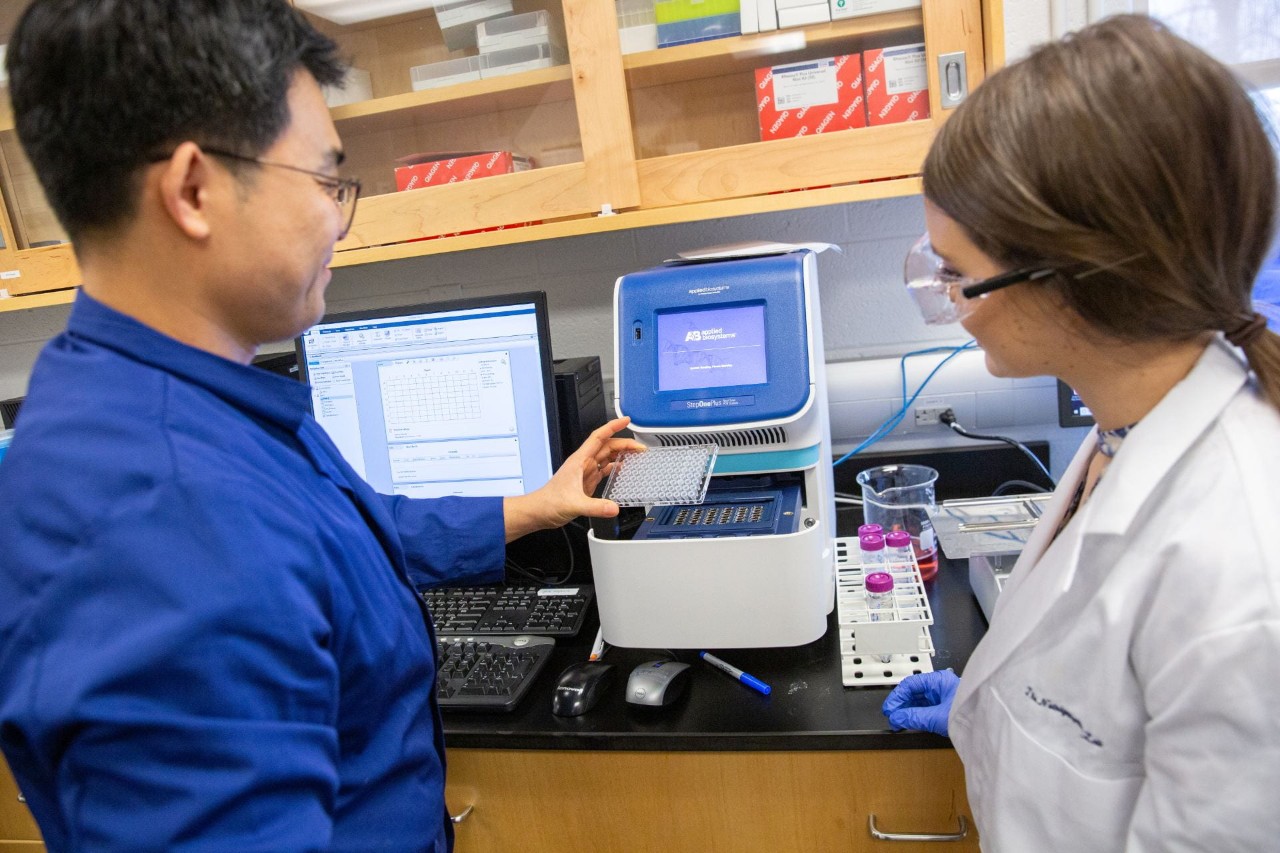
HUMAN NUTRITION MS

About the program
The Master of Science in Human Nutrition (MSHN) program at University of Delaware emphasizes advanced knowledge of core nutrition principles and prepares students for advanced practice, research, and leadership roles. The focus of the MSHN is nutritional science, and the application of biochemistry, physiology, and biology principles to human nutrition in health and disease. Areas of emphasis include research and projects related to prevention or treatment of disease; nutrition in infancy, childhood, and aging; community nutrition; cardiovascular physiology; and identifying and clarifying relationships between diet and health.
The program enables students to pursue their degree through either a thesis or non-thesis option (can choose no concentration or a concentration in dietetics, public health or health coaching). Both options include a core of required credits in nutrition and research methods and elective courses or concentration courses to fulfill the remainder of the program credits.
Decisions on admissions are made by the Nutrition Science (NS) Graduate Programs Committee. Students will be admitted to the program based on enrollment availability, the availability of faculty mentorship, and their ability to meet the following minimum recommended entrance requirements:
- Minimum undergraduate cumulative index of 2.75, and 3.00 in major field;
- 3 letters of reference;
- For international students who do not apply for a teaching assistantship, a TOEFL score of 575 or higher (paper-based), TOEFL iBT of 90 or higher, or IELTS of 6.5 is required. International students applying for a teaching assistantship must have a paper-based TOEFL score of 600 or higher, TOEFL iBT of 100 or higher or IELTS of 7.0
Prerequisite course requirements for regular admission to the MSHN include:
- physiology (one course)
- inorganic chemistry (two courses, Chem 1 and Chem 2)
- organic chemistry (one course)
- biochemistry (one course)
- human nutrition with a biochemistry prerequisite
- Applicants must submit all materials directly to the University of Delaware Graduate College using the online admission process before admission can be considered. Admission applications are available here.
- Application Documents:
- A graduate application essay.
- Current curriculum vitae.
- A minimum of three letters of recommendation (it is recommended that at least two be from academic references).
- Official transcripts.
Applications (all materials) for the MSHN Program will be reviewed on a rolling basis between January 15 and March 15 for admission to the program at the beginning of the following fall semester. Since application decisions will be made on a rolling basis within this timeframe (January 15th – March 15th), applicants are strongly advised to complete and submit applications as early as possible. The materials required for the application to be considered complete include the application form, undergraduate/graduate transcripts, at least three letters of recommendation, curriculum vitae, and a graduate application essay (directions for the graduate application essay may be found on the University of Delaware’s Graduate Admissions website
The MSHN is a 32-credit program designed to be completed in 2 years and includes a thesis or non-thesis option (with options for a concentration).
Thesis Option
- 20 credits of course work
- 6 credits of thesis research
- 6 credits electives
- Thesis proposal defense
- Thesis defense
Non-thesis option option (choice of no concentration, a dietetics concentration, a public health concentration or a health coaching concentration)
- 20 credits of course work
- 3 credits of field project
- 9 credits of electives or concentration courses (will differ based on concentration)
- Comprehensive Exam
- Phytochemicals and their role in prevention and reduction of age- and nutrition-related diseases (Sheau Ching Chai, PhD RD)
- Body composition, energy metabolism and nutrition assessment in chronic and acute illness; clinical nutrition assessment; diagnosis and management of disease-associated malnutrition (Carrie Earthman, PhD, RD)
- Dietary fiber, nutritional assessment and nutrition-related diseases (Richard Fang, PhD, RD)
- Nutritional and chronic disease epidemiology; maternal and child nutrition; endocrine disruptors and other environmental chemicals (Melissa Melough, PhD, RD)
- Eating disorders in emerging adults; psychological outcomes of interventions to control body weight; eating and health-related behaviors (Carly Pacanowski, PhD, RD)
- Behavioral weight management interventions in pediatric and adult populations; basic feeding studies manipulating diet (Shannon Robson, PhD, MPH, RD)
- Public health nutrition, vitamin D and bone mineral metabolism (Alisha Rovner, PhD)
- Infant and child feeding practices, cultural competency, global health/nutrition, immigrant health/nutrition (Kelebogile Setiloane, PhD)
- Early childhood nutrition, diet composition and energy balance in healthy individuals and in those with chronic disease (Jillian Trabulsi, PhD, RD)
